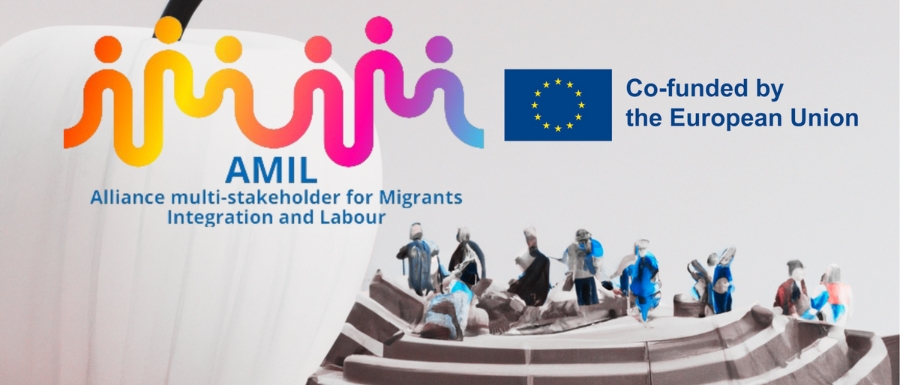AMIL, the Alliance Multi-Stakeholders for Migrants Integration and Labour, promotes sustainable integration of third-country nationals into the labour market by enhancing the MEIC methodology, empowering migrants to engage in their integration through person-centred approach and orientation and training programs. Over the next 20 months, it will implement a collaborative plan leveraging partner expertise to tackle challenges and explore innovative solutions, benefiting local experiences and fostering knowledge sharing among partners in Greece, Cyprus and France.
Programma Integra explores the various reasons why Italy, Greece, and Cyprus were selected for the AMIL project. Situated along key migration routes, these countries serve as primary entry points for migrants and refugees from diverse regions of Africa, Asia, and the Middle East. Given that AMIL aims to enhance the economic and labour integration of newly arrived individuals, it is crucial to focus on the countries where they first settle. In addition to geographical factors, these nations face economic and social challenges that necessitate a targeted approach to effectively address their needs.
Italy faces notable employment disparities between its native and foreign populations.
In 2023, the employment rate for migrant workers stood at 63.4%, compared to 66.6% for native workers. A primary concern in this context is job insecurity: while only 12.7% of Italian workers held temporary contracts, a significant 36% of migrant workers were employed under such contracts. This disparity underscores a fragmented labour market characterised by limited inclusivity and stability for migrants. The data reveals a clear divide between migrant and native workers, highlighting the urgent need for reform.
Greece presents an even more challenging scenario, with an unemployment rate of 22.2% among migrant workers.
This indicates that job opportunities for this segment of the population are severely constrained, reflecting significant limitations in the labour market. Across different countries in Europe, migrant people often work in more precarious conditions than the native population, with disadvantageous conditions such as temporary contracts and fewer labour protections. In countries such as Italy and Greece this situation is particularly pronounced as disparities between foreigner and native workers in the labor market are among the most severe in Europe.
Cyprus faces similar problems, with labour force participation levels significantly lower compared to the EU average.
AMIL is committed to addressing these challenges. Utilising the MEIC Methodology (Migrants Economic Integration Cluster), the project focuses on enhancing migrants’ skills, facilitating their access to employment, and promoting more effective inclusion policies within the labour market. The initiative has several key objectives: not only to integrate migrants into society but also to strengthen the economic and social fabric of host countries. By offering innovative and inclusive solutions, AMIL aims to create a more cohesive community, fostering a mutually advantageous environment for all.
Italy, Cyprus, and Greece were chosen for the AMIL project because of their strategic geographic positions as primary entry points to Europe, as well as the complex challenges they face regarding the economic integration of migrants into society and the labour market. This project offers a unique opportunity to enhance working conditions and reduce disparities between native and migrant workers in these countries. By addressing these challenges, AMIL aims to foster a more equitable and inclusive labour environment for all.
